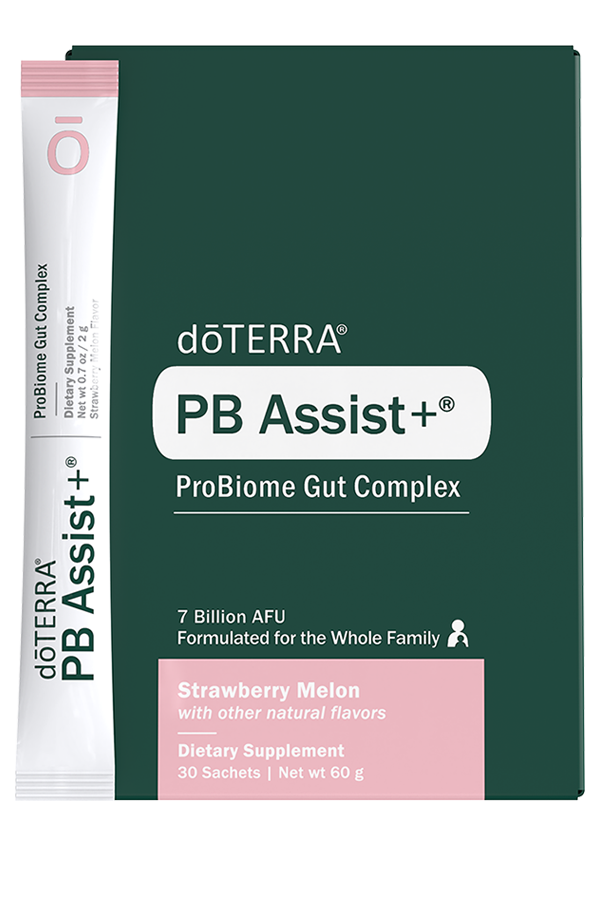Origin: a Latin derivative
meaning "Gift of the Earth."
- Shop
-
Our Story
- View Our Story Home
- Who We Are. . . .
- What We Do. . . .
- Why We Do It. . . .
-
dōTERRA[doh-teh-ruh]
Discover the Microbiome


What Is the Microbiome and What Is Its Function?
Human beings have evolved alongside trillions of tiny organisms called microbes. In fact, scientists estimate there are at least as many microbes in your body as there are human cells! These microbial communities are called microbiomes. Your microbiome functions like a huge, invisible organ that influences every aspect of your health. You may have heard about your gut microbiome, but your microbiome involves more than just the digestive system.
Your Microbiome Is More than Just Your Gut
Your microbiome exists throughout your body, including your skin, mouth, eyes, ears, nose, lungs, kidneys, urinary tract, reproductive system—basically anywhere that has contact with the outside world! Each microbial community communicates with and helps support your cells and vital organs, which is foundational for system health.
Dr. Russell Osguthorpe, chief medical director for doTERRA, explains how the microbiome exists throughout your body in this fascinating video. According to Dr. Osguthorpe, diversity within your microbiome is essential. Unfortunately, many people aren’t getting the diversity they need, which means their microbiome diversity shrinks as they age. Fortunately, there are things you can do to improve your microbiome today!
Diversity Matters
Your microbiome is like a garden, where the bacteria, viruses, and fungi are the different plants and insects. Just like a healthy garden needs a good balance of plants and insects to thrive, your body needs a diverse and balanced microbiome to stay healthy. And just like how a garden can grow out of balance if there’s just one type of plant or too many insects, your microbiome can also become unbalanced. So it’s important to take care of your microbiome by eating a diverse and healthy diet, getting enough sleep, and managing stress.
Healthy microbiomes have more good microbes—sometimes called flora—than bad, but there’s more to it than just numbers. Diverse microbiomes are more resilient at handling stressors and adapting quickly to changing circumstances. You need various microbes to metabolize food and supplements, produce important signaling messages, and assist the immune system, among other crucial functions.
What Does the Microbiome Do for Your Body?
If you take care of your microbiome, it’ll take care of you. Your microbiome’s job is to weed out the good bacteria from the bad. In today’s world, words like bacteria and virus have negative connotations, but not all of them are bad! In fact, many are essential to your health. When you support a healthy microbiome, your body becomes much better at determining which ones are helpful.
Different Microbiomes in Your Body
The gut microbiome helps you digest food and absorb nutrients. It also helps protect your body from harmful invaders, like how a fence around a garden keeps out unwanted pests.
The brain is a central processing unit, meaning everything you encounter is processed by it, organized into patterns, and then distributed as signals to the rest of your body.
Your skin is a physical barrier that protects you against foreign pathogens. Like the microbiota in your gut, these essential microorganisms protect and educate your immune system.
Your nose, sinuses, and lungs work alongside your immune system, and your mouth is an ideal environment for microorganism growth.
Together, the various microbiomes in and on your body work to keep your immune system strong and your metabolism healthy by enhancing the good microbes and kicking out the bad.
A Healthy Microbiome Contributes to Healthy Aging
Scientists are learning that microflora diversity naturally declines as you age. The good news is healthy lifestyle habits promote a healthy microbiome, which in turn supports healthy aging. These healthy lifestyle habits are the same ones that promote overall wellness: a balanced and nutritious diet, exercise, and plenty of restful sleep.
What Are the Five Types of Microbiota in the Microbiome?
Your microbiome contains bacteria, archaea, fungi, protists, and viruses. Just like different natural habitats, your body has various niches where microbes reside. These niches include your skin, mouth, gut, and other mucous membranes. No matter where you look in the body, you’ll find communities of these tiny organisms living there. You’re like their life raft.
The organisms in your microbiome live better as a community than individually, meaning they depend on each other. Going back to the garden analogy and the importance of microbiome diversity, can you imagine if you lived on a planet that only grew one type of food? Not only would it be terribly boring, but it’d also negatively impact your health.
Avoid Over-Sanitation
It’s important to support and encourage microbial diversity. As you consider ways you and your family can do that, limit heavy sanitation.
Sanitizers can protect against pathogens, but your microbiome is supposed to help your body take care of itself. Disinfecting every corner and crevice of your life can prevent your friendly microbes from thriving and halt information that could be essential to optimal bodily function. Over-sanitizing is like going to college with a blank textbook. There isn’t much you can get out of a blank book! But when you encourage diversity in your microbiome, your body can do what it’s designed to do and learn how to separate the good bacteria from the bad. This encourages healthier metabolism and a stronger immune system.
How Do I Boost My Microbiome?
Proper Nutrition and Digestion
The foundation of microbiome support is proper nutrition and digestion. Your microbiome is healthiest when you eat a balanced diet with a variety of whole foods—especially raw fruits and vegetables—and fermented dishes. Research has shown fast food can decrease the number and variability of bacteria in your gut, which can lead to weight challenges.
Daily Movement
Along with proper nutrition and digestion, you also need daily movement to support your metabolism. Studies suggest exercise enhances and encourages microbiome diversity. You can stack your metabolic hacks!
The things you do on a regular basis to support your microbiome matter. There may be times when you’re on the road and have to stop to eat some processed food. When you do, get right back on the wagon when you can. It’s the little choices you make daily that really influence microbiome diversity.
Rest and Manage Stress
Proper rest and stress management supports healthy flora. Prioritizing sleep and stress management while working on your microbiome health will create a positive feedback loop for both areas.
In this video snippet, Dr. Brannick Riggs, vice president of education at doTERRA, shares how certain lifestyle choices impact your microbiome. If you’re someone who eats up educational research, you’ll love the simple way Dr. Riggs explains your microbiome health.
Choosing a Quality Microbiome Supplement
Have you ever looked at the nutritional facts on a probiotic supplement and wondered what all those names and numbers mean? The names refer to the bacteria species, while the numbers next to the name refer to a specific strain within the species. And, as we’ve said before, diversity matters—a lot! You want a microbiome supplement with multiple strains and species—far more than one, two, or even a few. So when you’re choosing a quality microbiome supplement, it’s important to consider the four Ps of supplementation.
Reading about the microbiome is fine, but if you’d like to learn more about key factors to look for when choosing a quality microbiome supplement, you’ll enjoy this video with Alex DaBell, vice president of global nutraceuticals and innovation at doTERRA. His four keys are:
- Species and strains
- Potency
- Survivability
- Scientific Backing
When you’re reading a label, you want to feel comfortable knowing the claims are accurate. Watch this video if you’d like to learn more:
The Four Ps of Supplementation
The four Ps to being “pro” biome are pre-, pro-, and postbiotics and ‘phages—short for bacteriophages. Let’s discuss what each of these means.
First, probiotic bacteria function like tiny factories within your body to produce beneficial nutrients, such as folate; vitamins B1, B2, and B12; and more. These microorganisms are like tiny superheroes that can help you with a variety of mechanisms.
Postbiotics are helpful substances created by probiotics that deliver benefits long after the probiotics have passed through the digestive tract.
Prebiotics are the food (or fuel) for probiotics.
Bacteriophages aren’t actually bacteria. They’re healthy viruses that infect and eliminate specific harmful bacteria.
Alex DaBell also briefly explains these four Ps and how they work together to support your microbiome in this video clip.
Meet doTERRA PB Restore™ ProBiome Complex
doTERRA PB Restore ProBiome Complex is designed with your whole-body biome in mind. It’s formulated as a foundational, holistic supplement to benefit your systemic health in a number of ways, including:*
- Supporting digestive health
- Maintaining the gut barrier integrity
- Promoting gut immune function
- Facilitating micronutrient synthesis
- Supporting a healthy metabolism
- Promoting respiratory, dermatological, and oral health
- Possibly supporting cardiovascular and urological health and brain and DNA function (more confirming clinical research is needed)
To learn more about how doTERRA PB Restore ProBiome Complex can benefit you, take the Microbiome Product Education Course, which goes into further detail on the different strains and workings of your microbiome.
Also, enjoy this free microbiome eBook!
If you’re interested in supporting your microbiome with a supplement that contains more strains and CFUSs than any other supplement on the market, try doTERRA PB Restore ProBiome Complex for yourself! You can enjoy a 30-day supply for just $47.50. Your microbiome will thank you.
Meet PB Assist+® ProBiome Gut Complex
doTERRA offers two quality microbiome supplements. While doTERRA PB Restore is meant for your body’s overall microbiome, PB Assist+ ProBiome Gut Complex provides targeted strains to specifically support gut and digestive health.*
PB Assist+ is safe and delicious for the whole family! Kids and adults have told us how much they love these strawberry-melon–flavored sticks. Each stick offers 13 strains of probiotics and one prebiotic. Its potency is strong enough for adults while being absolutely safe for kids. Enjoying PB Assist+ as a family is one of the easiest ways to promote healthy habits in your kids and give them diverse probiotic strains from an early age.
To learn more about the benefits of PB Assist+ ProBiome Complex, explore our microbiome course today.
doTERRA Probiome Product Course
Two Is Better than One
Did we mention the 13 strains in PB Assist+ ProBiome Gut Complex are different from the 24 probiotic strains in doTERRA PB Restore? That means when you take these together, you’re going to get 37 strains of probiotics. Add in pre- and postbiotics, plus bacteriophages (remember those four Ps?), and that’s a whopping 43 bioactive components!
If you’re interested in trying these supplements, learn more about doTERRA ProBiome supplements today!
doTERRA PB Restore ProBiome Complex


PB Assist+ ProBiome Gut Complex
These natural solutions empower you in your wellness journey to prioritize a healthy microbiome.*
doTERRA ProBiome Product Course
Related Content
*These statements have not been evaluated by the Food and Drug Administration. This product is not intended to diagnose, treat, cure, or prevent any disease.


